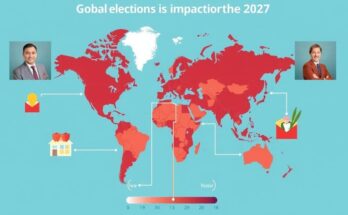Uruguay’s recent elections have been overshadowed by uninspiring candidates and voter disengagement, particularly among younger demographics. High youth unemployment and social issues contribute to political apathy, raising concerns about the future of democracy in the nation. While older voters also express dissatisfaction, reconnecting with disillusioned youths is essential for preserving Uruguay’s political stability.
In recent times, Uruguay’s presidential elections have garnered little attention due to the uninspiring nature of the candidates and their lack of dynamic engagement with potential voters. This led to a disappointing outcome where no candidate secured a majority, resulting in a runoff election. Historically, political events in Uruguay have been characterized by vibrant activism and community involvement, particularly given the nation’s past struggles against dictatorship. However, a disengaged youth demographic highlights an emerging political crisis that threatens Uruguay’s democratic integrity.
Despite its favorable reputation within Latin America, a significant percentage of young people, as indicated by a 2023 Latinobarómetro poll, appear willing to sacrifice democratic principles in exchange for effective governance. These sentiments are fueled by high youth unemployment rates at 26%, exceeding those of neighboring Argentina. Moreover, challenges such as high school dropout rates, food insecurity, and mental health issues further exacerbate this disillusionment. There is an evident disconnect between the political leadership and the concerns of younger voters who find the primary candidates to be unrelatable and inaccessible.
Additionally, older generations share similar frustrations with the current political climate, expressing critique over rising crime rates, corruption, and government ineptitude in addressing poverty. As the nation heads toward another electoral decision, underlying apathy and discontent could jeopardize the stability and democratic values that have characterized Uruguay for decades, highlighting the urgent need for political leaders to reconnect with the younger population that feels increasingly alienated.
Uruguay has long been viewed as a stable and democratic nation in South America, largely due to its history of nonviolent political transitions and a strong commitment to democratic values following years of military dictatorship. However, the current election cycle is marked by a distinct lack of enthusiasm among voters, particularly the youth, who feel increasingly marginalized despite the country’s perceived economic stability. Key issues such as unemployment, poverty, and mental health challenges are driving a wedge between the populace and their leaders, indicating a potential shift in political engagement and loyalty that could have far-reaching implications for future governance.
In conclusion, the recent elections in Uruguay reflect a troubling trend of voter disengagement, particularly among the youth who feel their needs are not being addressed by current candidates. With a significant portion of the population expressing willingness to abandon democratic values in favor of effective governance, it is imperative that political leaders evolve their approach to connect with disenfranchised voters. The implications of these sentiments, if left unaddressed, could challenge the stability of one of Latin America’s most cherished democracies.
Original Source: www.nytimes.com




